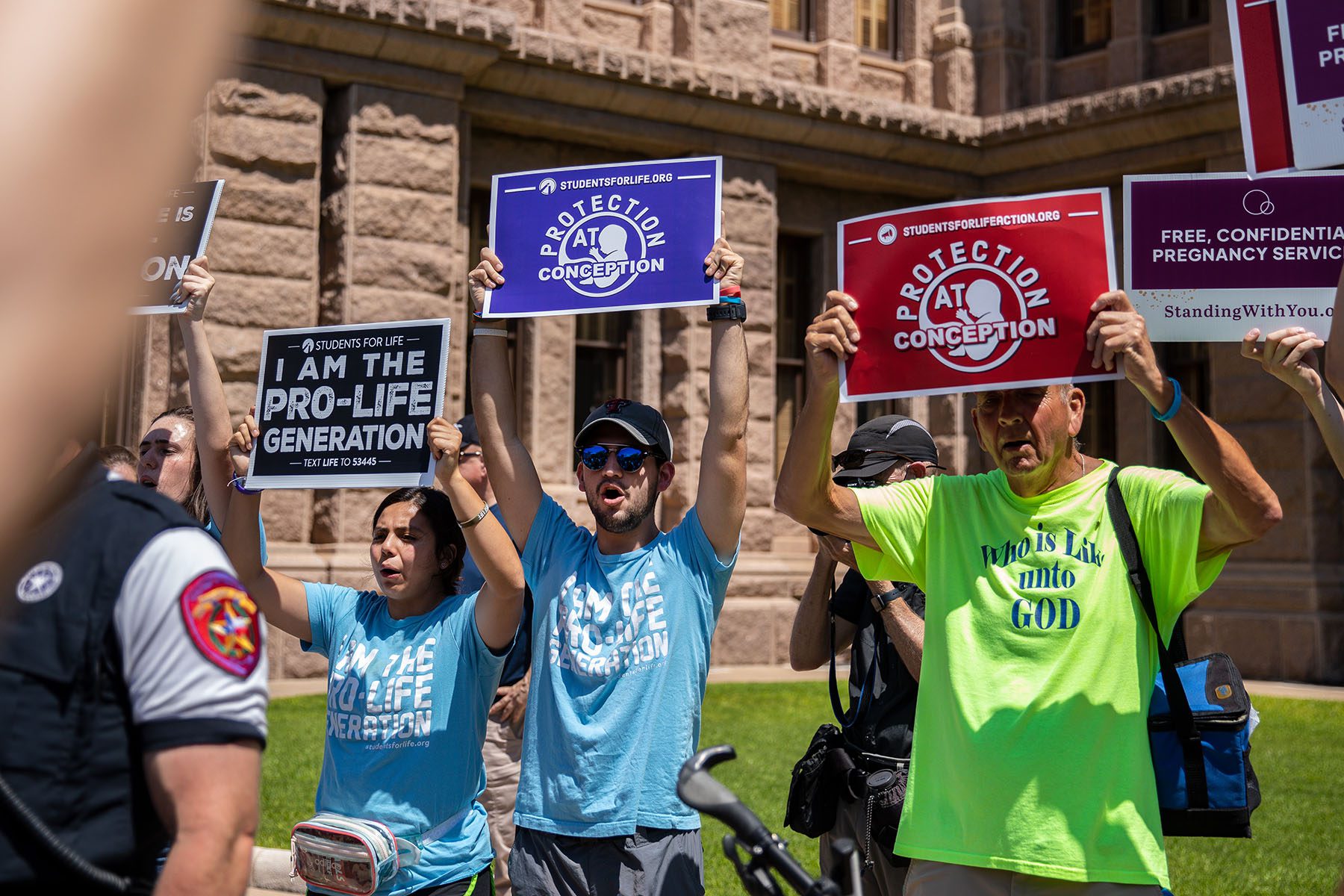As statehouses across the country prepare for next year’s legislative sessions — most for the first time since Roe v. Wade was overturned — Republican lawmakers are pushing for further restrictions on reproductive health, even in states where abortion is already banned.
But fissures are already emerging. Now, anti-abortion lawmakers must decide if they will push new abortion bans — a subject of debate among some abortion opponents — if they will amend existing bans to allow for abortions in cases of rape or incest, or if they will move to other reproductive health issues such as contraception. Abortion opponents have struggled to agree on all of them, especially with total abortion bans proving unpopular among voters.
“We will see this split in the Republican Party around following essentially their base, which wants to ban abortion without any exceptions, and the larger public,” said Elizabeth Nash, who tracks state policy for the Guttmacher Institute.
Near-total abortion bans are in effect in 13 states, and others have limited access: In Georgia, the procedure is banned for people later than six weeks of pregnancy, and in Florida and Arizona, it is banned after 15 weeks of pregnancy. Bans in seven other states have been temporarily blocked but could take effect pending state court rulings.
With Republicans controlling the U.S. House, federal abortion legislation — whether a ban or national protection — is unlikely to pass. State legislatures are the likeliest source of new abortion policy, and most work only part-time, meeting to consider bills for a few months either every year or every other year. The legislative year typically starts in January, but lawmakers are starting to prefile bills, offering a first glimpse into what they hope to accomplish next year.
Watching the state lines
Two bills in Texas, one of the few states that has bills prefiled, show how legislation could prevent people from leaving the state to access abortion.
Republican lawmakers have put forth a bill that would prohibit government entities from giving someone money that might be used to travel out of state for an abortion. Another bill would eliminate state tax breaks for businesses in the state that help cover their employees’ travel costs associated with getting an abortion outside of the state.
Though no other states have similar bills yet, those could, if passed, offer a model for other states seeking to restrict abortion access further without directly banning interstate travel. Texas has already banned abortion completely, and it was the first state to eliminate access to abortions after six weeks, even before Roe v. Wade was overturned.
In Missouri — which, prior to Roe’s overturn had some of the most restrictive abortion policies in the country — lawmakers have begun to pre-file bills intended to keep people from accessing abortion. The procedure is already banned there, but no state law prevents people from getting medication abortion pills from another state, or from traveling out of state for an abortion.
If passed, these bills could change that. One would make it a felony to transport drugs that are intended to be used to induce an abortion, though the bill would not criminalize pregnant people. (Similar legislation last year did not pass.) Another bill would treat a fetus as a person — legislation that could effectively equate abortion with murder. Both could pass this session, Nash said, though it’s hard to tell what abortion bills lawmakers will prioritize until they come back to the capitol.
Emergency contraception access
In states with abortion bans in place, some lawmakers and lobbyists, notably in Idaho and Missouri, have expressed interest in limiting access to some forms of emergency contraception such as Plan B. Major anti-abortion groups, such as Students for Life and several state-based chapters of the Right to Life organization, also oppose the so-called morning-after pill.
But it’s not clear if those types of restrictions will gain traction — at least immediately. In a recording obtained by ProPublica of a meeting between anti-abortion organizations and Tennessee lawmakers, some abortion opponents suggested legislators hold off on passing contraception regulations for at least a few years, until outrage over state abortion bans had abated.
The Susan B. Anthony List, an anti-abortion lobbying group, will be working closely with state legislatures on a handful of issues this year, said state policy director Katie Glenn. Glenn, one of the people present at that meeting, told The 19th that Plan B restrictions are not something she has heard as “a mainstream Republican or pro-life view.”

Further restrictions
In some states where abortion is not yet banned — including Nebraska, North Carolina, South Carolina and Florida — there will likely be renewed discussion over further limiting when in pregnancy people can get abortions. In all four states, Republicans control the legislatures, though North Carolina’s Democratic governor could veto some proposed restrictions.
“A year ago, Roe v. Wade was very limiting and now we’re going to have a lot more of a conversation about where states want their laws to end up,” Glenn said.
Florida legislators have already said they intend to pass a new abortion ban this year, though it’s not yet clear how early in pregnancy they will limit the procedure. In South Carolina, whose six-week ban has been blocked by state courts, legislators came to an impasse this summer over the details of their proposed near-total abortion ban — specifically whether to include exceptions for people pregnant because of rape or incest. (In practice, such exceptions don’t actually work. Still, laws without any exception whatsoever have proven to be exceptionally unpopular with voters.)
“This is the split in the party that is creating a problem for them. They can’t get their people in line,” Nash said. “Is that going to continue? Or are people going to essentially get beaten into submission by leadership or the governor?”
Beyond gestational limits, the Susan B. Anthony List also intends to focus on curtailing access to medication abortions, the two-drug regimen used to terminate a first-trimester pregnancy. In states where abortion remains legal, that could mean laws banning people from getting medication abortions through telemedicine, in which pills are sent through the mail and a patient consults with a medical provider virtually. The practice is endorsed by medical experts as well as the Food and Drug Administration and World Health Organization.
Medication abortions are the most commonly used method for people seeking to end a pregnancy. Pills taken from home can be easier to manage than traveling out of state for an abortion, which can cost hundreds of dollars and require time off work, explaining one’s absence to friends and family and setting up days’ worth of child care — often insurmountable barriers for people seeking to terminate a pregnancy.
Medication abortions have also become far more prevalent in states where abortion is illegal; people in Texas have been able to acquire medication from Mexico, and research shows that people across the country living in states with abortion bans have had the pills mailed from European health care providers.
Abortion opponents are also seeking a way to limit people’s ability to get those pills, particularly by leaning on state law enforcement to block access to medication abortions. But it’s not yet clear how they might do that, or what kinds of laws state legislators might pass.
Criminalization of abortion
Last spring, Louisiana lawmakers debated whether to pass a law treating abortion as murder, a definition that would have criminalized people who get abortions. But that bill failed to gain traction, and it’s not clear if anti-abortion lawmakers will pursue similar legislation this year. Abortion bans typically do not directly punish the pregnant person, and only a handful of states have laws explicitly penalizing people who acquire an abortion outside the medical system.
“They’re going to try to put some kind of guardrails to limit access to care, some kind of penalty,” Nash said. “I don’t know if it would be [treating abortion as] murder versus something else that might be more palatable.”






